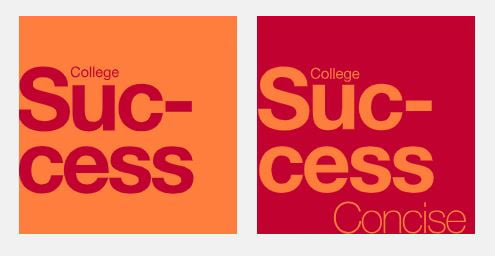

First-Year Experience and College Success webinars and more!
XanEdu is pleased to present these resources focused on First-Year Experience and College Success programs - why are they important, what makes them successful.
Our FYE resources feature guest experts to talk about specific topics that can be an important part of First-Year Experience programs such as Mental Health, Executive Functioning, Belonging and more. The resources are applicable to both staff and faculty supporting these important programs.
This webinar series features guest presenters such as Dr. Amy Baldwin, author of OpenStax College Success and College Success Concise, along with other featured subject matter experts.
Spring 2024 FYE Webinar Series
2024 FYE Trends – Research Report Takeaways
Gain insights on formats, materials and top challenges facing students and program leaders from a recently conducted faculty survey.
Presented April 12th
Customization, OER and AI – Oh My!
Best practices for compiling and customizing content, with examples of collaboration and demonstration of how to use AI with human editorial oversight can be used.
Presented May 6th
Incorporating Motivation Skills into FYE with Sports Psychology Concepts
Learn about sports psychology concepts to provide insights into the drivers of motivation and how you can help students.
Please note: sorry, this webinar has been cancelled
AI Webinar Series for FYE
AI is a reality for students and instructors, but there are still many open questions - How can this technology enhance learning environments? When is it OK to use? Will it replace faculty? How can it make me more efficient? As first-year students transition to college, there are many open questions around how to harness the potential of this technology.
XanEdu is pleased to present a series of webinars tailored to the first-year transition community and their relationship with AI. Dr. Jean Mandernach, Executive Director for the Center for Innovation in Research and Teaching, will lead a 3-part series diving into AI topics that are top of mind for college success and first-year experience leaders.
This series will explore how to use AI to transform teaching and learning, how to foster student engagement, and introduce strategies to enhance studying through AI.
Interested in seeing firsthand how AI can help you with your FYE course, visit this page to learn more.
Session 1:
Unleashing the Power of AI: Transforming First-Year Teaching and Learning
Presented April 15, 2024
Session 2:
Teaching with AI: Strategies to Foster First-Year Students’ Learning and Engagement
Presented April 22, 2024
Session 3:
Empowering First-Year Success: Writing and Studying with AI
Presented April 29, 2024
Past FYE webinars on-demand
Video links are found in the descriptions below. Bookmark this page and check back often to see what new webinars are being offered and what new FYE reports / blogs are available. Contact us to discuss your FYE course materials needs.
-
Webinar 1
First-Year Experience Programming - Best Practices and Current Trends
Presenters: Dr. Amy Baldwin and Dr. Laurie HazardFirst-Year Experience Programming: Best Practices and Current Trends
The pandemic highlighted the need for colleges and universities to reconceive best practices related to student success and retention. As higher education reflects and innovates, institutions are challenged to develop courses and programs that will work most effectively for their campuses’ demographics, culture, and climate.
While rethinking and reflecting, scholars and practitioners alike are revisiting sets of educational practices that researchers have identified as having a significant impact on student success and retention. These are called “High Impact Practices” or “Best Practices.” For instance, first-year experience and student success courses and programs have long been considered a fundamental best practice designed to help students mediate the transition from secondary education to college. While many of these courses and programs have proven effective, there is no “one size fits all” approach for students.
Beyond tailoring courses and programs for particular campus demographics, more recently, colleges and universities across the country have been under increasing pressure to shift from a student-centered to a learner-centered paradigm. The shift in paradigm to become learner-centered requires educators to change their approaches, emphasize the importance of innovation, and commit to their teaching and learning missions.
Learning Outcomes:
- Reflect on the evolution of First-Year Experience (FYE) models
- Discuss common goals, objectives, and practices in student success and First-Year Experience (FYE)
- Explore how curricular innovation has impacted FYE programs
- Investigate current trends in FYE such as on-line and experiential learning
- Examine outcomes assessment data and discuss assessment practices
Join Dr. Amy Baldwin (University of Central Arkansas), author of OpenStax College Success and College Success Concise books, and Dr. Laurie Hazard (Founder, Recognize Your Potential) as we walk through the research and evidence demonstrating the importance to First Year programs and their correlation to academic success.Presenters: Dr. Amy Baldwin and Dr. Laurie Hazard
Originally presented July 25, 2023
View presentation on-demand:
-
Webinar 2
Mastering Executive Functioning Skills: A Key To Academic Success
Presenter: Dr. Laurie HazardStudies from recent years suggest that the switch to online learning and back again damaged students' focus, motivation, and emotional regulation. In addition, rates of anxiety, depression and suicide have risen sharply. In general, students of all ages have performed worse academically post-pandemic. The strategies students need to possess to mediate the post-pandemic outcomes are called executive functioning skills or self-regulatory behaviors.
Researchers argue that self-regulatory behaviors are at the heart college success. In fact, studies indicate that the ability to manage time and combat procrastination is more predictive of college achievement than standardized tests and high school grades. Unfortunately, many undergraduate students enter post-secondary institutions without having mastered the basic executive functioning skills and self-regulatory behaviors that foster college success. The inability to master these behavioral and cognitive skill sets contributes to negative outcomes ranging from compromised immune systems to damaged relationships to impeded academic performance. This presentation analyzes the challenges of teaching self-regulatory behaviors and outlines effective pedagogical tools to address those challenges.
Learning Outcomes:
- Define executive functioning skills and self-regulatory behaviors
- Examine basic research findings
- Explore behavior change model
- Critique and understand flaws in current time management pedagogy
- Identify psychodynamics of procrastination from different theoretical frameworks
- Analyze and understand the cycle of procrastination
- Improve strategies to help your students master self-regulation of learning
- Discover tips to implement effective pedagogical tools immediately
Presenter: Dr. Laurie Hazard (Founder, Recognize Your Potential)
Date: Sept. 19
Time: 3:00-4:00 ET
View Presentation On-Demand:
-
Webinar 3
Practical strategies for fostering belonging in the first-year
Presenter: Bryce BuntingNew college students face a host of challenges as they navigate their first-year experience. Among these challenges are the feelings of marginalization, disconnection, and isolation that students often experience as they encounter the new and unfamiliar experiences that come with beginning college. Indeed students who fail to feel connected to their academic and social communities are much more likely to leave college, particularly students from marginalized and historically-excluded populations.
In contrast, students who feel a sense of belonging or a sense of community are significantly more likely to experience thriving during their first year and beyond. In fact, research suggests that a psychological sense of community is the single most powerful predictor of thriving among first-year students. Consequently, supporting students in experiencing a strong sense of belonging may be one of the most important outcomes for the first-year experience.
This session will briefly review foundational research on the role of belonging in the first-year experience, introduce foundational principles for fostering belonging among first-year students, then offer practical strategies that can be adapted and applied on individual campuses.Dr. Amy Baldwin will be joined by Dr. Bryce Bunting, an expert in building belonging touchpoints. Attendees will have the opportunity to ask questions and share best practices in this interactive session.
Learning Outcomes:
- Define the construct of college student belonging
- Explore foundational research related to belonging in college students
- Identify foundational principles for incorporating belonging into first-year courses and programming
- Discuss practical examples of belonging interventions
- Reflect on how belonging could be incorporated into current first-year programming.
Presenter: Dr. Bryce Bunting
View Presentation On-Demand:
-
Special OpenStax Webinar
Support for Struggling Students
Presenter: Dr. Amy BaldwinThe transition to college can be challenging for many students. Many institutions have implemented First-Year Experience programs to aid in these transitions. Despite these resources and support systems, some students still have difficulty transitioning to college and are in danger of failing.
How do we help these students before it’s too late?
XanEdu and Dr. Amy Baldwin, sr. contributing author of OpenStax College Success, College Success Concise, and Preparing for College Success present a tactical discussion about how best to support struggling students. Dr. Baldwin draws from her vast experience with these programs as well as her in-depth knowledge of the first-year experience landscape to share actionable ideas and best practices that can be implemented to help your students succeed.Presenter: Dr. Amy Baldwin
On-Demand Video Link (requires registration)
-
Webinar 4
Empowering Students to Be Their Best Through Improving Mental Health Literacy
Presenters: Dr. Amy Baldwin and Jill Landsbaugh Kaar, PhDSupporting students’ mental health is an important component on every campus. In this webinar, learn how mental health skills and supports can be proactively built into the first year student experience.
In order for students to be their best selves they must focus on their own health and well-being. Through this webinar, we will discuss the importance of the mind-body connection, describe differences between stress versus anxiety and sadness versus depression, and identify ways for you to help your students maintain and enhance their emotional health.
Learning Objectives:
- Understand the mind and body connection.
- Describe differences between stress versus anxiety and sadness versus depression.
- Understand mental health risks and warning signs.
- Identify ways for your students to maintain and enhance their emotional health.
- Outline steps you can follow to help your student’s ask for help.
Dr. Amy Baldwin will be joined by Jill Landsbaugh Kaar, PhD, who brings experience and expertise into successful incorporation of mental health supports and resources within the First-Year experience..
Presenters: Dr. Amy Baldwin and Dr. Jill Landsbaugh Kaar, PhD
View Presentation On Demand
Create customized, relevant & affordable course materials that boost engagement and student success.
XanEdu has been working with faculty for over 24 years to quickly develop totally-on-topic course materials that are affordable for your students. We make it easy to customize materials for your FYE course. Our team will guide you through the publishing process to develop a print or digital (or both!) solution perfectly suited for your course.

Articles and other FYE Resources




Article


Resource

Article
Podcast
FYE Virtual Workshop Series
Facilitated, one-hour working sessions to guide you through a design-thinking process that aligns with your campus. Registrations now open. Spaces are limited due to workshop format.
Study Skills
Small steps to incorporate these skills into first-year programming
Presented: Friday, March 1st, 2024
Presentation materials are available upon request. Complete this form to request workshop materials.
Measuring What Matters
Take the first steps beyond course evaluations – identify priorities
Presented: Wednesday, March 6th, 2024
Presentation materials are available upon request. Complete this form to request workshop materials.
Mental Health
Small steps to address a specific component in your program
Presented: Wednesday, April 3rd, 2024
Presentation materials are available upon request. Complete this form to request workshop materials.
Learn more about affordable, customizable solutions for First-Year Experience and Student Success

Learn more about custom publishing options to make your First-Year program materials accessible and affordable for students by visiting our FYE Information page, or book a consultation to get in touch!
